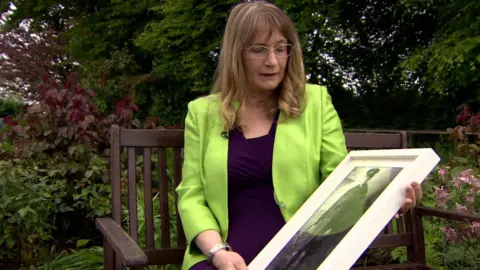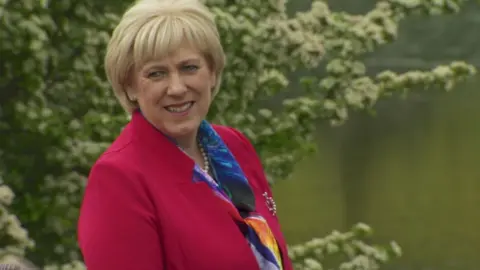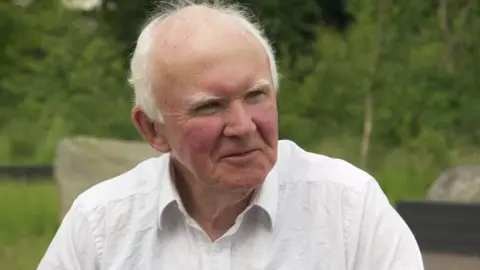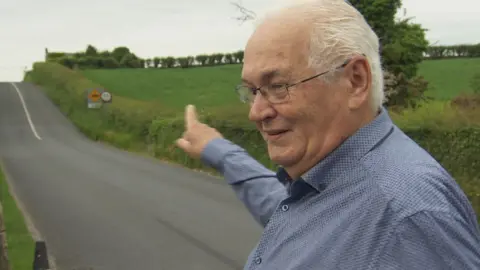NI 100: A tale of two villages and Irish partition
 BBC
BBCWhen Northern Ireland came into being a century ago, the everyday lives of those living along the border - on both sides - changed overnight.
For Angela Graham's grandparents, Protestant unionists from the village of Drum in County Monaghan, it was a new and difficult dawn.
"One night they went to bed British and the next morning they woke up Irish. It was an imposed partition," she said.
Her grandfather George Reilly fought for the Army in World War One.
Two years before, his relatives were among 12,000 unionist men in County Monaghan, who signed the Ulster Covenant in protest against Home Rule.
But when the six-county Northern Ireland was formed, Monaghan, along with Cavan and Donegal, became part of what was then called southern Ireland.
"That went very hard on the people who were unionists at the time like my grandparents - they were a minority left on the wrong side," she said.
"The new governments being set up on both sides of the border really had no place for minorities whether you were a nationalist minority in the new state of Northern Ireland, or a Protestant minority in the Irish Free State.
"They were hurt, they felt let down."
'Lives were in danger'
Some stayed, many left. At the time of partition, County Monaghan was 25% Protestant. Today, Angela says, that figure is more like 7%.
For those who stayed, it was difficult in the years immediately following partition - and it became difficult again during the Troubles.
"We were seen as different, probably treated with suspicion. Like many families, we had family members in the UDR or RUC," said Angela.
"They couldn't come to visit, their lives were in danger, we couldn't talk openly about them. I only have two cousins in Ireland, they were both in the police, you couldn't invite them for tea, you couldn't invite them for family celebrations.
"When I got married, my wedding reception was held in County Fermanagh, otherwise the family circle couldn't have attended - that was the reality."

Irish cabinet minister Heather Humphreys was also born in Drum. The Fine Gael politician represents Cavan-Monaghan.
Her grandfather signed the Ulster Covenant too.
But, she said, the Republic of Ireland is a very different place now than it was in the first half of the 20th Century.
She said unionists now have nothing to fear from a united Ireland.
"There's nothing to fear in this country in terms of respect for your culture, your identity and we celebrate diversity," she said.
"We've come a long way. I honestly would say to them, I'm a product of this country and I have been given every opportunity and I'm very, very proud of the country I live in.
"I serve as a minister in cabinet. I got those opportunities, it wasn't through privilege.
"I was reared in a small village in County Monaghan and all of those opportunities were given to me and, I think, if Protestants in Northern Ireland look at the opportunities I have had, they should see there is nothing to fear here."
However, she also said talk of a border poll was divisive, and she wanted to see people uniting on this island, rather than focussing on a united Ireland.
"A united island is what I want to see, where people are working together, in harmony and moving on with their lives and enjoying this wonderful country that we have," she said.
'Houses were divided'
Thirty-five miles away, across the border into Northern Ireland is the village of Forkhill in south Armagh.
Like unionists in Drum, its Catholic residents felt let down and and abandoned by politicians in southern Ireland when the border cut it off from its natural hinterland, according to historian Kevin Murphy.

In the early part of the 1920s, there were various plans to move the border.
Under one proposal, Forkhill and its surrounds would have been transferred into southern Ireland, or the Free State as it became known.
But that never happened.
"It didn't happen because the Boundary Commission, well the British were never serious about it," said Kevin Murphy.
"The Free Staters like Collins and Griffith thought there could be something made out of it.
"By 1925 of course, Eoin McNeill resigned from it and that was the death knell of it.
"Basically it didn't happen because it was designed not to happen, it was never really a player and then of course this area was flooded with B Specials and we were under basically military rule.
"Families were divided, parishes were divided, houses were divided."
'Cut them off'
Anthony Flynn's family home is literally yards from the border outside Forkhill.
"They woke up one morning without anyone asking them what they thought or if they wanted this border there," he said.
"It cut them off from the whole hinterland that they farmed in and visited in and went to school in, so it was a total change of life for them.
"In this area, Dundalk was the main town and now you couldn't go there, buy stuff and take it back."
In 1922, the Flynn family home became caught in the crossfire of a gun battle between the IRA and the B Specials.

"They moved in to attack the IRA here but were caught, took over Flynn's house and the Flynn family were in it, including my father who was five at the time.
"His mother was very worried about him and she put him into the [butter] churn and put the lid on it to keep him safe. But the gun battle went on here for 24 hours."
A tale of two villages on opposite sides of the border.
One hundred years on, memories of partition have been passed down through the generations.
